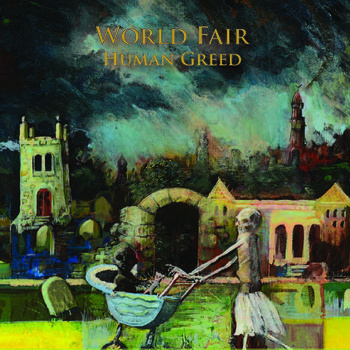Time lapse photography, the technological trick often applied to plant life, reveals the otherwise imperceptible choreographies of organic growth. Small shoots that take days to grow seem to be wriggling in real time, reaching for the nourishment of sunlight, before sprouting limbs and leaves, flowers and fruits, in a dance of fertility. If such a lens could be applied to Michael Begg’s and Deryk Thomas’ discography as Human Greed, to visualise their sound’s evolution, we might see a similar set of movements. Beds of somewhat barren and bleak glassy electronics formed the majority of their first two releases – 2001’s Consolation and 2006’s Pilgrim: New World Homestead – their oblique traces of tonality and spoken language remaining ungerminated by acoustic instruments until their third album Black Hill: Midnight At The Blighted Star. Here, bold bursts of melody broke through their scorched, earthy abstractions, largely in the form of Julia Kent’s lush cello. In our time-lapsed mode this seems to be rapidly followed (three years’ later!) by a much expanded ensemble on ‘Fortress Longing’, that saw Human Greed start to bloom symphonically with orchestral instrumentation.
This gradual morphology – from wilder, wayward pastures to more cultivated, formal landscapes – seems to have reached its fullest form with World Fair. However, here, our time lapse film not only displays the fruits of song and polyphony that recall both Ligeti’s modernism and Pärt’s devotion, but also, through a heavy set of branching contexts, the inevitable end of the life cycle where the fruits drop and rot, the leaves dry out and the plant shrivels, returning to the earth. The two press releases Begg authored for this release reveal this aspect through a narrative concerned with entropy, the natural law concerning the inevitable end of civilisation and all natural systems including the universe itself. Such cheer is conceived through a fiction concerning a group of god-fearing musicians from the 16th century who travel through time to arrive in mid-20th century New York. Installed in the executive Cloud Club of the Chrysler Building their pious compositions start to acknowledge faith in an entropic fate.
Of course, this story is not directly apparent through listening alone, instead the tale acted as a score of sorts from which Begg could blend his interests in early music and 20th Century minimalism. But what does come across so very strongly is a deep sadness and morbidity that soaks through World Fair’s life cycle. Its lead instruments of swollen, cinematic strings and solemn piano are gilded by Human Greed’s customary electronic shards and undertows to make the tender, sorrowful state so immediately involving. But there are many curious additions to this sound pool that betray the album’s more elusive influences and attitudes. Recordings of church interiors are positioned throughout, creating a musty, reverent air; the spoken poem of ‘Waiting In A Car’ intones "I believe in heat death, I believe in counting stars…" the text reprising throughout the album, most notably as a disorientating plainsong collage on ‘A New Bed’; Steven R Smith’s raw, blues guitar fights a losing battle against the elements on ‘Chrysler’; while ‘Fire’ and the closing track, ‘The Landscape’ are beautifully-formed sound objects based on sonic notions of burning.
By combining traditional chamber manoeuvres with field recordings, poetry and digital processing, Begg and co create a serious, thought-provoking drama in sound. Using composition as theatre, World Fair‘s tracks only really work within the context of each other, like chapters in a novel. And, although a cautionary tale that’s turned up too late, it’s a novel well worth listening to. The album’s title combined with its content is suggestive of how the American Dream optimism of consumerism diverts our attention from the real fate that awaits us all; of how the coins of technological progress are often, if not always, two-sided, where even music, once shared and determined by places such as churches, is now transmuted into fragmented, personal soundtracks on roving, portable devices.
Although there is always a subtle sense of jubilance in Human Greed’s music to offset the melancholy and the despair, or in spite of it, World Fair, charged by both the music of faith and science, is perhaps the most sublimely saddest of all their work to date. And what could be sadder than faith in entropy?
<div class="fb-comments" data-href="http://thequietus.com/articles/16478-human-greed-world-fair-review” data-width="550">



